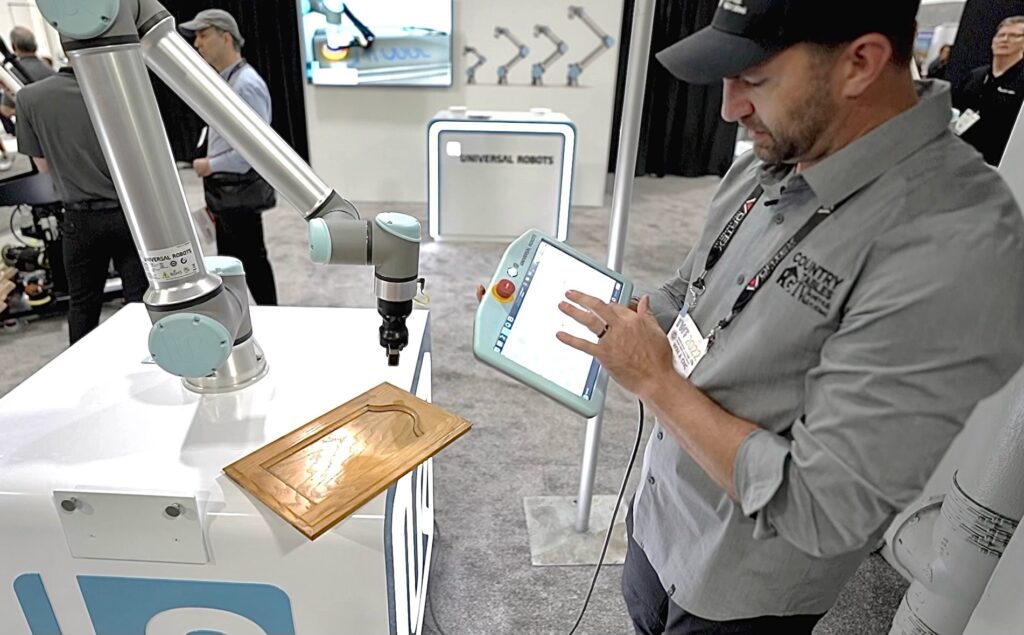IWF Woodworking Today
Artificial Intelligence & Manufacturing
May 31, 2023 | Dan Wellens

In the past year, Artificial Intelligence has grown rapidly. Artificial Intelligence (AI) now has the potential to revolutionize the way all businesses operate, bringing about transformative change across various industries. With its advanced data analysis capabilities and machine learning algorithms, AI enables companies large and small to make data-driven decisions and optimize day-to-day processes. From enhancing customer experience through personalized recommendations to streamlining operations with predictive analytics and automation, AI is empowering businesses to become more efficient. Moreover, AI-powered technologies like “natural language processing” are opening new avenues for communication, research, and product development. As AI evolves, its impact on the wood manufacturing industry is conceivably endless.

For wood manufacturing businesses utilizing automated technology, taking the first step with AI technology will be an exciting and transformative journey. From time to time, I’ll be detailing how I am taking my business on an exploration of AI integration. I will begin by identifying the areas where AI could potentially enhance my business’s daily operations by implementing product optimization; quality control; machine maintenance; and digital client interfacing. I’ll be researching different AI software applications to explore the various technologies relevant to day-to-day operations—beginning with small-scale pilot projects to test the feasibility and effectiveness of AI operations. I will systematically select a specific area or process where AI can be implemented for a measurable impact. This approach will allow me to assess the benefits and gather feedback before scaling up in hopes of making it easier for small businesses to leverage AI without significant modifications or complex integrations.

So what are Artificial Intelligence Technologies?
Machine Learning (ML): ML is a subset of AI that focuses on enabling systems to learn and improve from data without being explicitly programmed. It includes techniques like supervised learning, unsupervised learning, and reinforcement learning.
Natural Language Processing (NLP): NLP enables computers to understand, interpret, and generate human language. It is used in applications like virtual assistants, chatbots, sentiment analysis, and language translation. This has the greatest potential for digital customer interactions.
Computer Vision: Computer vision involves teaching computers to interpret and understand visual information from images and videos. Applications range from facial recognition and object detection to autonomous vehicles and medical imaging.
Expert Systems: Expert systems mimic the decision-making ability of human experts in specific domains. They use knowledge bases and rules to provide recommendations, diagnoses, and solutions.
Robotic Process Automation (RPA): RPA involves using software robots to automate repetitive tasks, reducing human effort and increasing efficiency in areas such as data entry, invoice processing, and customer support.
Deep Learning: Deep learning is a subset of ML that employs artificial neural networks to process and analyze complex data, such as images, audio, and text. It has shown significant advancements in areas like image recognition, speech recognition, and natural language understanding.
The field of Artificial Intelligence is rapidly evolving and with new third-party plug-in options and real-time internet updating—which means the ways of traditional business are about to change dramatically. AI will soon be as common as a credit card for businesses. But remember that AI integration is a gradual process, and it is essential to approach it with clear goals, collaboration, and a willingness to adapt and learn along the way.
Apply to Exhibit
Grow your business at the premier global woodworking trade show.
Show Hours & Location
International Woodworking Fair
Tuesday–Friday
August 6–9, 2024
Tuesday–Thursday
8:30 AM–5:00 PM*
Friday
8:30 AM–2:00 PM*
*Building A opens 7:30 AM Tue-Fri
Georgia World Congress Center
285 Andrew Young International Blvd
Atlanta, GA 30313
